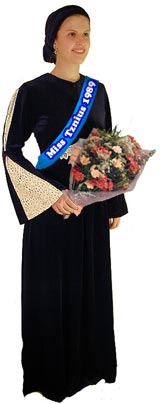Although I can't actually remember whether he played "King Without a Crown," that iconoclastic first single that a friend swore was going to condemn him to one-hit wonder status forever, it didn't feel like Matisyahu's brief history was being reinvented last night. On the seventh of his eight-night Hanukkah stint at the Music Hall of Williamsburg (insert the appropriate jokes about how Shabbat makes Orthodox Jews late for everything here), he played a more-than-two-hour set that was alternately pensive and meandering and quietly grooving and straight-ahead all-out rocking.

Matis's music has always lived in the space between worlds -- the secular and religious, the contemplative and the party vibe, the reggae and the rock. (Here's an
article about his new work, just to get you caught up.) Last night, the wings of the place were filled with Hasidic Jews who wanted to come to the show but were avoiding the dancing, and the tiny two-steps-up division served as a makeshift boundary for them. The crowd was all over the place -- I was skeptical that it would be mostly Orthodox Jews, and afraid that it would be mostly hippies, but most of the folks there were just regular people. Good-looking people, too, as opener
Mike Doughty pointed out repeatedly in his set*.
The couple in front of us were these Asian-Australian cool-kid transplants who wouldn't have been out of place at the Yeasayer show down the street, which gave me hope that (a) the one-hit wonder thing isn't happening, and (b) his music really isn't as insular as my default listening position (jumping on the furniture around the house, payos bopping, shouting out Aramaic phrases at the top of my lungs) might give one reason to think. And when a hippie did finally pop up, it was onstage -- this dreadlocked kid going wild on a whole array of percussion instruments, doing intense and admirable things to a tambourine.
Which brings us to the music. The band started playing before Matisyahu came onstage, which in normal circumstances I always think of as an egotistical pretense -- the crowd raves, the band builds up, and the singer ascends to his place of glory. But when Matis came on, there was none of that -- it wasn't like he was ignoring it, but more like he was unaware that it was happening at all.
The band launched into "Sea to Sea," which I always used to call "the
Amidah song" before I looked it up on Amazon twenty seconds ago -- it's the song that opens his live album, which is the band doing their low bass funk thing while Matis sings the Hebrew words that introduce the silent devotional. It was faster than the album version, and the band was putting in everything, and Matis was holding his own but not going crazy.
Turns out he was just building up.
From there they blasted through "Youth," which gave the crowd the requisite recognizable song before launching into the meat of the set. It leaped between hard, driving guitar rock and more chill, rhythm-propelled stuff. At times it didn't seem like songs so much as ideas, Matis and the band tossing freestyles at each other. At one point, he was alone on stage with Shalom Mor, an Israeli oud player who flew in especially for this series of concerts, and a harpist, and -- after nearly an hour spent beatboxing-free -- he dropped into a fast beat.
That was the pace of the entire show. Usually, you see a band play three songs, and, boom, you know what they're about. Here, every twenty minutes it was a completely different concert. I started to get bored during the first extended jam (although it might have just been annoyance with the cloying pot smell that suddenly sprang from half a dozen different places...damn Hasidim), and then the guitarist started plucking a pop song, the drummer jumped in, and Matisyahu started freestyling over it -- well, not exactly freestyling so much as an impromptu rendition of the liturgical song "Yibaneh Ha'Mikdash," which roughly translates to "building the Temple."
I think the best songs alive are cover songs. Maybe it's because they stick around forever; maybe because they're the songs that are so good that they're addictive. That is, I think, where prayers com from. They're essentially cover songs that we perform every day.
I couldn't tell you why, but "Yibaneh" is the moment I realized that I really love what Matisyahu is doing. I've never been that big a fan of reggae, and though I've warmed to
Jewish music, I still mostly feel like Jews and I live in two different worlds: they don't get me, and I don't get them. But that moment when he was screaming out the words -- words that most of the crowd probably didn't understand, and even more of them weren't paying attention to the meaning of -- I felt like I was in the middle of his lyrics and like I understood. There's a
midrash that says that the Third Temple isn't going to be built by the Messiah; that we're going to have to start building it ourselves. Not to be *too* cliche, but it seems like Matisyahu's doing exactly that.
___________
* -- who is an amazing musician in his own right, and has a huge archive of concerts on mp3
here. I might write about his set later, but we'll see.







 And, no matter
And, no matter 











